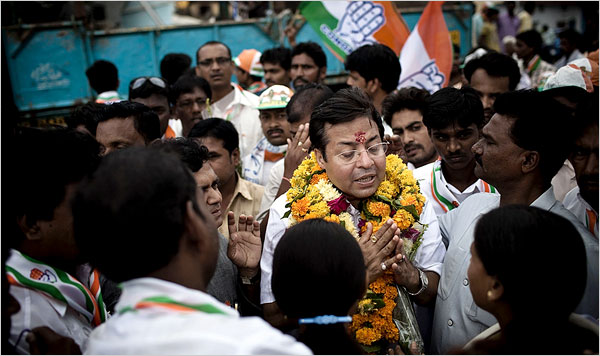AMRAVATI, India — Rajendra Shekhawat, nicely polished in a pressed white shirt and neatly parted hair, his face sunburned from campaigning in the south Indian sun, says he is running for office as a common man. His pink cheeks suggest otherwise, though, since common men in India usually toil outdoors without requiring sunscreen.
Another clue is the elephant in every room in which he campaigns in this city in the state of Maharashtra: Mom. She is Pratibha Patil, the president of India.
“I’m not using my parents’ name at all,” Mr. Shekhawat, 42, stated in an upstairs office in his parents’ home, which he is indisputably using as a campaign headquarters. “I’m running on my own. But for sure, being in a political family for so many years does help me, and gives me easy accessibility for doing the work of the people.”
Democracy is built on the oft-tarnished ideal that any man or woman can get elected, but in India, home to the world’s biggest democracy, it helps to be part of a political family. The Nehru-Gandhi dynasty, scions of the governing Congress Party, is India’s version of the Kennedys. But other political dynasties, large and small, have proliferated so rapidly that many analysts believe nepotism is corroding the political system.
India’s chaotic politics can sometimes seem democratic to a fault: the election cycle rarely pauses and the country has roughly 1,050 registered national and regional political parties. But most of the major parties, including the majority Congress Party, are internally undemocratic; there are no primaries and party leaders discourage public dissent. Party bosses select candidates and have shown an increasing tendency to select their own relatives.
Here in Amravati, the decision by Congress Party leaders to run Mr. Shekhawat for Tuesday’s elections in Maharashtra State has provoked an angry backlash. He is running for a state assembly seat in the same district where his parents once held elected office. But to put him there, Congress leaders pushed aside Mr. Sunil Deshmukh, a former radiologist and two-term Congress incumbent with broad local support. Leaders offered Mr. Deshmukh the chance to run elsewhere, but he rebelled and is seeking his own seat as an independent.
“This is a fight against injustice,” declared Mr. Deshmukh, warming to his role as political insurgent. “If he is defeated, that will send a very strong message to all parties, no? If the person is only the son or daughter or a nephew of an important person, you can’t just thrust him on the people.”
Across India, political families are entrenched at every level of government and politics. At least nine of the 32 members of Prime Minister Manmohan Singh’s cabinet either descended from political families or have children seeking or holding office. Parliament is littered with political families; a recent study found that 31 of the 58 women elected had a husband, brother, father or father-in-law in politics.
The trend is even more glaring at the state level. In Maharashtra, analysts estimate that 30 or more party candidates running this month are from political families. The state’s chief minister, the top executive post, is the son of a former chief minister. This is also the case in two other states while the Congress Party is strongly considering replacing the late chief minister of Andhra Pradesh with his son.
“It has gotten into the DNA of the Indian political system,” said Jagdeep Chhokar, a founding member of the Association for Democratic Reform in New Delhi. “To control the workings of the party, the leader depends on trusted people. And one of the traditions of Indian culture is that you trust family members more than outsiders.”
Indian politics have a high turnover rate and voting blocs can be defined by region, religion, caste or community. Yet analysts say Indian voters favor a familiar family pedigree, partly because of a cultural reverence for the family and because of habits in some regions that trace back centuries. Several of the royal families who ruled over feudal states have today evolved into political families.
Modern India’s political marketplace is so crowded with parties and candidates that the “brand” of a familiar family name can bring an advantage, several analysts say. And the closed nature of political parties often perpetuates the dynastic problem; in several cases, rebels who broke from one party have formed their own and installed relatives around them.


